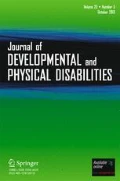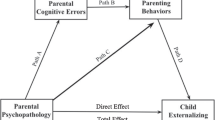Abstract
Although previous research indicates that both parental attributions for child misbehavior and parenting discipline are associated with child problem behavior, there is a lack of research examining the relationship between these variables in parents of young children with Autism Spectrum Disorder (ASD). This study investigated the relations between parental attributions, parenting discipline, and child problem behavior in parents of preschoolers with ASD (n = 67) as compared to parents of neurotypically developing preschoolers (n = 57). Group differences in levels of parental attributions of child internality, child stability, and child controllability, as well as lax and overreactive discipline and level of parent-reported child problem behavior, were analyzed. Additionally, child ASD status, parental attributions of controllability, lax discipline, and child problem behavior were examined within a serial multiple mediator model. Results indicated that, compared to parents of neurotypical preschoolers, parents of preschoolers with ASD were more likely to use lax discipline and attribute their child’s problem behavior to factors that were uncontrollable by the child and stable over time. There were no significant group differences in attributions of child internality or overreactive discipline. The relation between child ASD status and level of child problem behavior was mediated through attributions of low child controllability and lax discipline, although controllability was the primary pathway to child problem behavior. The findings contribute to the limited literature on parental attributions, parenting discipline, and child problem behavior, and can inform future intervention for child problem behavior, particularly in the area of parent training.

Similar content being viewed by others
References
American Psychiatric Association. (2013). Diagnostic and statistical manual of mental disorders (5th ed.). Washington, DC: American Psychiatric Association.
Arim, R. G., Garner, R. E., Brehaut, J. C., Lach, L. M., Mackenzie, M. J., Rosenbaum, P. L., & Kohen, D. E. (2012). Contextual influences of parenting behaviors for children with neurodevelopmental disorders: Results from a Canadian national survey. Disability and Rehabilitation, 34(26), 2222–2233.
Arnold, D. S., O'Leary, S. G., Wolff, L. S., & Acker, M. M. (1993). The parenting scale: A measure of dysfunctional parenting in discipline situations. Psychological Assessment, 5(2), 137–144.
Ateah, C. A., & Durrant, J. E. (2005). Maternal use of physical punishment in response to child misbehavior: Implications for child abuse prevention. Child Abuse and Neglect, 29(2), 169–185.
Baker, J. K., Smith, L. E., Greenberg, J. S., Seltzer, M. M., & Lounds Taylor, J. (2011). Change in maternal criticism and behavior problems in adolescents and adults with autism across a seven-year period. Journal of Abnormal Psychology, 120(2), 465–475.
Bettelheim, B. (1967). The empty fortress. New York: Free.
Bölte, S., Westerwald, E., Holtmann, M., Freitag, C., & Poustka, F. (2011). Autistic traits and autism spectrum disorders: The clinical validity of two measures presuming a continuum of social communication skills. Journal of Autism and Developmental Disorders, 41(1), 66–72.
Brei, N. G., Schwarz, G. N., & Klein-Tasman, B. P. (2015). Predictors of parenting stress in children referred for an autism spectrum disorder diagnostic evaluation. Journal of Developmental and Physical Disabilities, 27(5), 617–635.
Bugental, D. B., New, M., Johnston, C., & Silvester, J. (1998). Measuring parental attributions: Conceptual and methodological issues. Journal of Family Psychology, 12(4), 459–480.
Chavira, V., López, S. R., Blacher, J., & Shapiro, J. (2000). Latina mothers’ attributions, emotions, and reactions to the problem behaviors of their children with developmental disabilities. Journal of Child Psychology and Psychiatry, 41(2), 245–252.
Cohen, J. (1988). Statistical power analysis for the behavioral sciences (2nd ed.). Hillsdale: Erlbaum.
Constantino, J. N., & Gruber, C. P. (2012). Social responsiveness scale, second edition (SRS-2). Los Angeles: Western Psychological Services.
Crowell, J. A., Keluskar, J., & Gorecki, A. (2019). Parenting behavior and the development of children with autism spectrum disorder. Comprehensive Psychiatry, 90, 21–29.
Del Vecchio, T., & O'Leary, S. G. (2008). Predicting maternal discipline responses to early child aggression: The role of cognitions and affect. Parenting: Science & Practice, 8, 240–256.
Dix, T., Ruble, D. N., & Zambarano, R. J. (1989). Mothers' implicit theories of discipline: Child effects, parent effects, and the attribution process. Child Development, 60(6), 1373–1391.
Dunlap, G., & Fox, L. (1999). A demonstration of behavioral support for young children with autism. Journal of Positive Behavior Interventions, 1(2), 77–87.
Durand, V. M., Hieneman, M., Clarke, S., Wang, M., & Rinaldi, M. L. (2013). Positive family intervention for severe challenging behavior I: A multisite randomized clinical trial. Journal of Positive Behavior Interventions, 15(3), 133–143.
Emerson, E., Blacher, J., Einfeld, S., Hatton, C., Robertson, J., & Stancliffe, R. J. (2014). Environmental risk factors associated with the persistence of conduct difficulties in children with intellectual disabilities and autistic spectrum disorders. Research in Developmental Disabilities, 35(12), 3508–3517.
Eyberg, S. M., & Pincus, D. (1999). Eyberg child behavior inventory and Sutter-Eyberg student behavior inventory-revised: Professional manual. Odessa: Psychological Assessment Resources, Inc..
Flannery, K. B., & Horner, R. H. (1994). The relationship between predictability and problem behavior for students with severe disabilities. Journal of Behavioral Education, 4(2), 157–176.
Fodstad, J. C., Rojahn, J., & Matson, J. L. (2012). The emergence of challenging behaviors in at-risk toddlers with and without autism spectrum disorder: A cross-sectional study. Journal of Developmental and Physical Disabilities, 24, 217–234.
Gershoff, E. T., Grogan-Kaylor, A., Lansford, J. E., Chang, L., Zelli, A., Deater-Deckard, K., & Dodge, K. A. (2010). Parent discipline practices in an international sample: Associations with child behaviors and moderation by perceived normativeness. Child Development, 81(2), 487–502.
Hattier, M. A., Matson, J. L., Belva, B. C., & Horovitz, M. (2011). The occurrence of challenging behaviors in children with autism spectrum disorders and atypical development. Developmental Neurorehabilitation, 14(4), 221–229.
Hayes, A. F. (2013). Introduction to mediation, moderation, and conditional process analysis: A regression-based approach. New York: The Guilford Press.
Horner, R. H., Carr, E. G., Strain, P. S., Todd, A. W., & Reed, H. K. (2002). Problem behavior interventions for young children with autism: A research synthesis. Journal of Autism and Developmental Disorders, 32(5), 423–446.
Howlin, P., Rutter, M., Berger, M., Hemsley, R., Hersov, L., & Yule, W. (1987). Treatment of autistic children. Oxford: John Wiley & Sons.
Jacobs, M., Woolfson, L. M., & Hunter, S. C. (2016). Attributions of stability, control and responsibility: How parents of children with intellectual disabilities view their child's problematic behaviour and its causes. Journal of Applied Research in Intellectual Disabilities, 29(1), 58–70.
Jones, T. L., & Prinz, R. J. (2005). Potential roles of parental self-efficacy in parent and child adjustment: A review. Clinical Psychology Review, 25(3), 341-363.
Karst, J. S., & Vaughn Van Hecke, A. (2012). Parent and family impact of autism spectrum disorders: A review and proposed model for intervention evaluation. Clinical Child and Family Psychology Review, 15(3), 247–277.
Kashahu, L., Dibra, G., Osmanaga, F., & Bushati, J. (2014). The relationship between parental demographics, parenting styles and student academic achievement. European Scientific Journal, 10(13), 237–251.
Lambrechts, G., Van Leeuwen, K., Boonen, H., Maes, B., & Noens, I. (2011). Parenting behaviour among parents of children with autism spectrum disorder. Research in Autism Spectrum Disorders, 5(3), 1143–1152.
Lovaas, O. I. (1987). Behavioral treatment and normal educational and intellectual functioning in young autistic children. Journal of Consulting and Clinical Psychology, 55(1), 3–9.
Lucyshyn, J. M., Irvin, L. K., Blumberg, E. R., Laverty, R., Horner, R. H., & Sprague, J. R. (2004). Validating the construct of coercion in family routines: Expanding the unit of analysis in behavioral assessment with families of children with developmental disabilities. Research and Practice for Persons with Severe Disabilities, 29, 104–121.
Maljaars, J., Boonen, H., Lambrechts, G., Leeuwen, K., & Noens, I. (2014). Maternal parenting behavior and child behavior problems in families of children and adolescents with autism Spectrum disorder. Journal of Autism & Developmental Disorders, 44, 501–512.
Morrissey-Kane, E., & Prinz, R. J. (1999). Engagement in child and adolescent treatment: The role of parental cognitions and attributions. Clinical Child and Family Psychology Review, 2(3), 183–198.
Myers, B. J., Mackintosh, V. H., & Goin-Kochel, R. P. (2009). “My greatest joy and my greatest heart ache:” parents’ own words on how having a child in the autism spectrum has affected their lives and their families’ lives. Research in Autism Spectrum Disorders, 3(3), 670–684.
O'Leary, S. G. (1995). Parental discipline mistakes. Current Directions in Psychological Science, 4(1), 11–13.
Osborne, L. A., McHugh, L., Saunders, J., & Reed, P. (2008). The effect of parenting behaviors on subsequent child behavior problems in autistic spectrum conditions. Research in Autism Spectrum Disorders, 2(2), 249–263.
Patterson, G. R. (1982). Coercive family process (Vol. 3) Eugene, OR: Castalia.
Preacher, K. J., & Hayes, A. F. (2008). Asymptotic and resampling strategies for assessing and comparing indirect effects in multiple mediator models. Behavior Research Methods, 40(3), 879–891.
Rhoades, K. A., & O'Leary, S. G. (2007). Factor structure and validity of the parenting scale. Journal of Clinical Child and Adolescent Psychology, 36(2), 137–146.
Romero, M., Aguilar, J. M., Del-Rey-Mejías, Á., Mayoral, F., Rapado, M., Peciña, M., et al. (2016). Psychiatric comorbidities in autism spectrum disorder: A comparative study between DSM-IV-TR and DSM-5 diagnosis. International Journal Of Clinical Health & Psychology, 16(3), 266–275.
Schanding Jr., G. G., Nowell, K. P., & Goin-Kochel, R. P. (2011). Utility of the social communication questionnaire-current and social responsiveness scale as teacher-report screening tools for autism spectrum disorders. Journal of Autism and Developmental Disorders, 42, 1705–1716.
Simons, L. G., & Conger, R. D. (2007). Linking mother–father differences in parenting to a typology of family parenting styles and adolescent outcomes. Journal of Family Issues, 28(2), 212–241.
Slep, A. M. S., & O'Leary, S. G. (1998). The effects of maternal attributions on parenting: An experimental analysis. Journal of Family Psychology, 12(2), 234.
Taylor, A. B., MacKinnon, D. P., & Tein, J. Y. (2007). Tests of the three-path mediated effect. Organizational Research Methods.
Weiner, B. (1980). A cognitive (attribution)-emotion-action model of motivated behavior: An analysis of judgments of help-giving. Journal of Personality and Social Psychology, 39(2), 186–200.
Whittingham, K., Sofronoff, K., & Sheffield, J. K. (2006). Stepping stones triple P: A pilot study to evaluate the acceptability of the program by parents of a child diagnosed with an autism Spectrum disorder. Research in Developmental Disabilities, 27(4), 364–380.
Whittingham, K., Sofronoff, K., Sheffield, J., & Sanders, M. R. (2008). An exploration of parental attributions within the autism spectrum disorders population. Behaviour Change, 25(4), 201–214.
Whittingham, K., Sofronoff, K., Sheffield, J., & Sanders, M. R. (2009). Do parental attributions affect treatment outcome in a parenting program? An exploration of the effects of parental attributions in an RCT of stepping stones triple P for the ASD population. Research in Autism Spectrum Disorders, 3, 129–144.
Wong, C., Odom, S. L., Hume, K. A., Cox, A. W., Fettig, A., Kucharczyk, S,… & Schultz, T. R. (2015). Evidence-based practices for children, youth, and young adults with autism spectrum disorder: A comprehensive review. Journal of Autism and Developmental Disorders, 45(7), 1951–1966.
Woolfson, L. (2004). Family well-being and disabled children: A psychosocial model of disability-related child behaviour problems. British Journal of Health Psychology, 9(1), 1–13.
Woolfson, L. (2005). Disability and the parenting paradox. The Psychologist, 18(7), 421–422.
Author information
Authors and Affiliations
Corresponding author
Ethics declarations
Ethical Approval
The study has been approved by the Institutional Review Board (IRB) at St. John's University. All procedures performed in this study involving human participants were in accordance with the ethical standards of the St. John's University IRB and the National Commission for the Protection of Human Subjects of Biomedical and Behavioral Research and with the 1964 Helsinki declaration and its later amendments or comparable federal ethical standards.
Informed Consent
Informed consent was obtained from all individual participants included in the study.
Conflict of Interest
The authors declare that they have no potential conflict of interest.
Additional information
Publisher’s Note
Springer Nature remains neutral with regard to jurisdictional claims in published maps and institutional affiliations.
Rights and permissions
About this article
Cite this article
Berliner, S.E., Moskowitz, L.J., Braconnier, M. et al. The Role of Parental Attributions and Discipline in Predicting Child Problem Behavior in Preschoolers with and without Autism Spectrum Disorder. J Dev Phys Disabil 32, 695–717 (2020). https://doi.org/10.1007/s10882-019-09715-y
Published:
Issue Date:
DOI: https://doi.org/10.1007/s10882-019-09715-y




